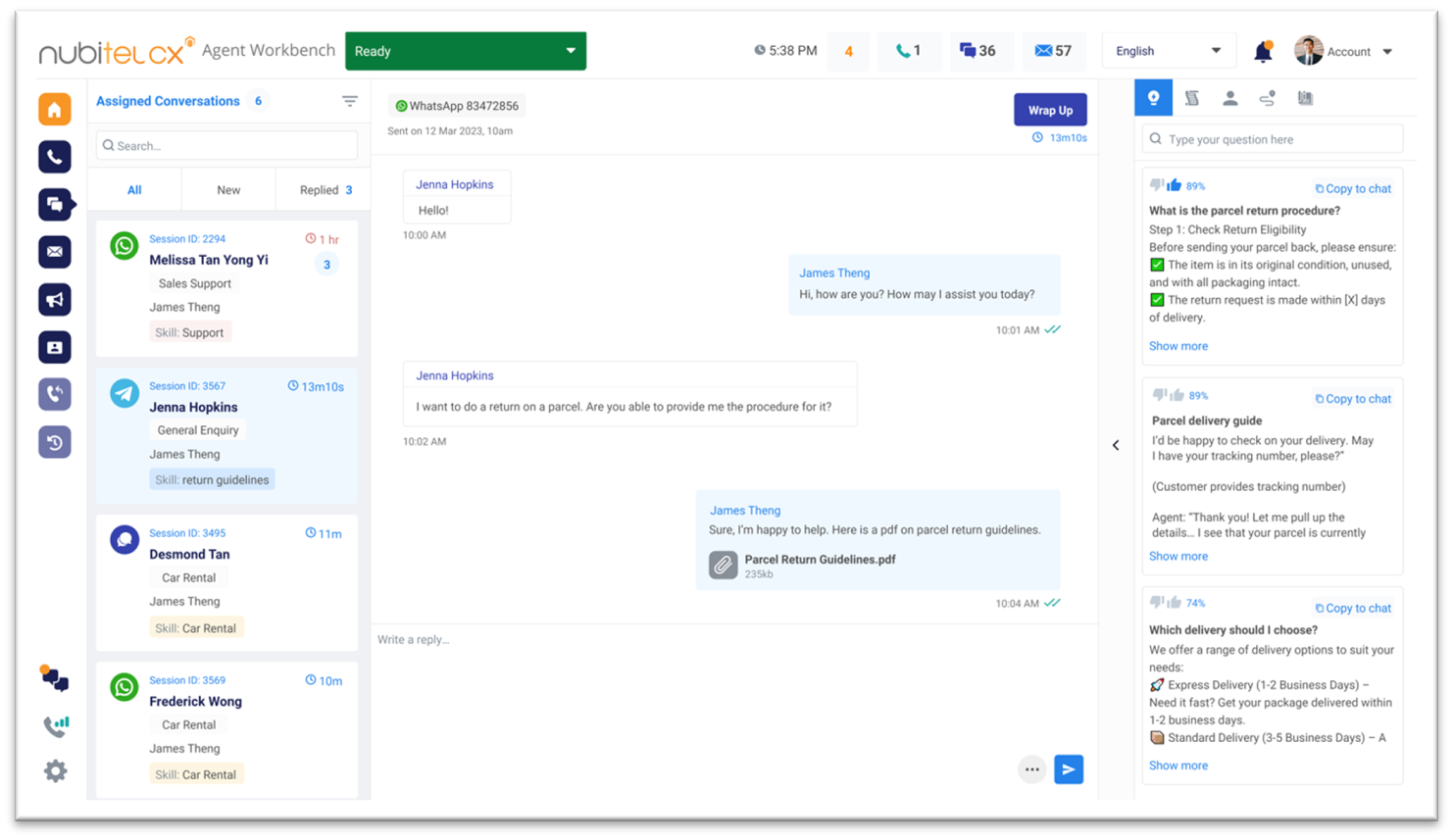Customers nowadays engage with businesses through multiple channels, including chatbots, email, social media, and phone support. They expect a seamless transition between these touchpoints for a smooth and consistent experience. However, when these channels operate in silos, customers face frustration from repeating information and experiencing delays. As a result, Gartner reports that 38% of Gen Z and millennial customers abandon inquiries when self-service options fail to meet their needs. To reduce customer churn and enhance satisfaction, businesses must know omnichannel strategies to ensure consistency across all touchpoints.
In this article, we will explore the key benefits of adopting an omnichannel approach and four best strategies to deliver a seamless customer experience.
Table of Contents
ToggleWhat Is Omnichannel Customer Service?
Omnichannel customer service refers to a unified approach where businesses integrate multiple communication channels to provide a seamless customer experience. These channels include phone calls, emails, live chat, social media, and self-service portals. Unlike multichannel support, where channels operate separately, an omnichannel strategy ensures customer interactions are interconnected, enabling a smooth transition between channels without losing context.
To effectively implement this seamless experience, businesses rely on a robust customer service platforms comprising a suite of applications. These applications facilitate four essential functions: contact routing and interactions, process orchestration, knowledge and insights, and resource management for ensuring efficient and personalized customer support.

Why Omnichannel Customer Service Is Necessary
According to the 2024 Gartner State of the Customer Survey, customer service preferences vary significantly across generations. 52% of Baby Boomers still prefer phone support, while only 28% of Gen Z relies on this channel. In contrast, Gen Z (18%) and Millennials (19%) show a stronger preference for web chat with a representative, highlighting a shift toward digital-first service interactions.

Gartner’s research underscores the importance of adapting customer service strategies to match evolving consumer behaviors. While businesses may prioritize the largest customer demographic, neglecting other segments can result in disengagement and customer churn. A robust omnichannel strategy ensures businesses can meet customers where they are whether through phone, live chat, email, social media, or self-service portals.
Key Advantages of Omnichannel Customer Service
The aforementioned insights highlight the growing importance of offering diverse service options to accommodate varying generational preferences. As customer expectations evolve, businesses must provide seamless and flexible support across multiple channels to enhance satisfaction and loyalty. Below, we explore the primary benefits of implementing an omnichannel customer support strategy.

High Customer Satisfaction
A well-structured omnichannel strategy enhances customer satisfaction by ensuring consistency and personalization across various touchpoints. Customers receive support without unnecessary delays or repeated explanations, leading to a more seamless experience.
Low Customer Effort
Reducing customer effort is a key component of effective omnichannel service. When customers can transition between channels without friction, they are more likely to remain engaged and complete their interactions without frustration.
Positive Word of Mouth
A smooth customer journey fosters positive experiences, encouraging satisfied customers to share their interactions with others. This organic advocacy enhances brand reputation and attracts new customers.
Customer Retention
When customers receive seamless and efficient support across multiple channels, they are more likely to stay loyal to the brand. A consistent experience builds trust and encourages repeat interactions.
Moreover, AI in contact centers is set to strengthen this experience. Agentic AI enhances customer interactions by handling inquiries, providing personalized recommendations, and continuously adapting to customer preferences.

Through real-time contextual suggestions and workflow automation, AI-powered Agent Assist tools help agents respond more effectively, reducing wait times and improving resolution rates. With AI-driven efficiency in customer service, businesses can deliver a more seamless customer journey, ultimately boosting retention and fostering long-term brand loyalty.
Top 4 Strategies to Take Your Omnichannel Customer Service to the Next Level
Developing an effective omnichannel customer service strategy requires careful planning and execution. Here’s how businesses can achieve this:
1. Understand Customer Preferences
Before implementing an omnichannel approach, businesses must understand their customers’ preferred communication channels. Conduct surveys, analyze past interactions, and leverage customer feedback to determine which platforms are most commonly used. This helps in prioritizing channel integration for maximum impact.
Tips:
-
- Use customer journey mapping to visualize how users interact with different touchpoints.
-
- Regularly review analytics to identify emerging customer preferences.
-
- Offer multiple feedback options, such as surveys, social media polls, and chatbots.
2. Choose the Right Technology
Selecting the right technology is crucial for an effective omnichannel strategy. Businesses should invest in customer service platforms that integrate multiple channels, automate workflows, and provide AI-driven chatbots and analytics tools. These features improve both customer interactions and operational efficiency.
To ensure seamless implementation, consider the following key tips for choosing the right technology:
-
- Support Multichannel Engagement – Your platform should enable customers to connect through their preferred channels, whether live chat, email, social media, or phone, ensuring accessibility and convenience.
-
- Enable Omnichannel Transitions – A seamless customer experience requires smooth transitions between channels. For example, a customer who starts an inquiry via chat should be able to continue the conversation over the phone without repeating information.
-
- Leverage Workforce Engagement Management (WEM) and Smart Routing – Effective customer service depends on optimized agent performance and intelligent routing. WEM tools enhance agent productivity, while smart routing directs customers to the right agent or department.
-
- Opt for Cloud-Based Solutions – Cloud platforms offer better scalability, flexibility, and remote accessibility, ensuring your system can adapt to evolving business needs.
-
- Ensure CRM and Database Integration – The platform should integrate seamlessly with your existing CRM and customer databases to provide a unified view of customer interactions.
3. Train Customer Support Teams
Even with the best technology, an omnichannel strategy will fail if customer support teams are not adequately trained. Agents should be equipped with the skills to navigate multiple platforms, use CRM tools efficiently, and provide consistent service across all channels.
Tips:
-
- Conduct regular training sessions on handling multichannel inquiries.
-
- Use AI-powered coaching tools to enhance agent performance.
-
- Provide agents with a knowledge base to ensure uniform responses.
4. Measure and Optimize Performance
To maintain an effective omnichannel support strategy, businesses must continuously monitor key performance indicators (KPIs) such as response time, resolution rate, and customer satisfaction. Using analytics and feedback tools, companies can identify gaps and improve their approach over time.
Tips:
-
- Set benchmarks for customer satisfaction and resolution times.
-
- Use customer feedback to refine processes and remove inefficiencies.
-
- Implement A/B testing to optimize messaging and response workflows.
Elevate Your Omnichannel Customer Service with Nubitel
As the digital landscape evolves, delivering seamless omnichannel customer service is no longer optional—it’s a competitive necessity. To truly stand out, businesses need a solution that unifies customer interactions, streamlines workflows, and enhances engagement across every touchpoint. That’s where Nubitel comes in.
At the forefront of customer experience innovation, Nubitel empowers businesses to craft fluid, intuitive, and highly responsive omnichannel support. Our platform is designed to break down communication barriers, ensuring customers receive a frictionless service experience no matter where they engage.
Let Nubitel be your partner in delivering an omnichannel experience that exceeds expectations. Schedule a demo today!





